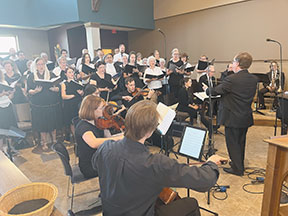
MADISON — The Diocese of Madison is scheduled to host two sacred music events in December.
On Sunday, Dec. 3, the Diocesan Schola will lead Solemn Choral Vespers and Benediction, and on Sunday, Dec. 17, the Diocesan Choir and Chamber Orchestra are featured in a Lessons and Carols service. Both events begin at 4 p.m. in the Holy Name Heights Oratory in Madison.
John Sittard, diocesan director of music, is conducting the events.
Reflecting on the past year
Sittard, who received a Master of Music degree in organ from the Indiana University Jacobs School of Music and has music ministry experience at the National Shrine of the Immaculate Conception in Washington D.C., is beginning his second year of work at the diocese and at St. Bernard Parish in Madison.
Sittard reflected on the past year and the impact of music at the diocesan level.
He said, “My responsibility as diocesan director of music is to make a connection to the universal that much clearer and much more present. For instance, the choral music we sing is sung in cathedrals throughout the world. It binds us to the Universal Church — this beautiful, rich treasury of sacred music. [We should know] that we’re not a museum. It’s alive and we present it, and we help people to enter more deeply into the mysteries of their faith through that expression of music. But there’s a universality about it, right? It can’t be mistaken for anything else.”
A great success for Sittard was helping with the Madison Diocesan Eucharistic Congress this September. At the congress, Sittard directed the diocesan choir and schola for evening Vespers, communal Morning Prayer, and Saturday and Sunday Masses. Sittard said, “[The congress] was an incredible experience. Saturday morning, we had a great attendance for Morning Prayer. And I’m sure there were people who have never prayed communal Morning Prayer before and it was just stunning. It was a whole weekend of incredible choral music.”
Serving as a model
“I think as a diocese, and certainly for diocesan levels, [the diocesan choir] needs to be the model of what the Church calls for. We can serve as a model and help to inspire and deepen that understanding of the universal Church as opposed to a specific community,” said Sittard. However, Sittard noted, “Community traditions are wonderful things.”
“We’re very temporal in our world. We look at the Church and we see everything through the prism of what’s here and now and realize that our tradition is so vast and it doesn’t start in our lifetime. [We shouldn’t] forget about that which came before and that which should be the foundation sacred music is built on,” said Sittard.
To explain what that sacred music foundation might be, Sittard said, “When we sing something as beloved as the Byrd: ‘Ave Verum Corpus,’ you realize this has been sung for centuries, right? And when we sing this on the parish level for Holy Week, on Holy Thursday, do you realize all the cathedrals around the world and even people who don’t share our Catholic faith are singing this?
“I mean, there’s something to this. This music is alive, and you realize that our time on this earth is just a blink of an eye. And in this music that has been handed down to us, we have a responsibility, we have an obligation that it moves forward.
“Now, I’m all about new composition and I do some composition myself, but there is this beautiful treasury of music and it does take special groups to do it. Not every church choir or parish has the resources to do it, but people need to hear it.
“I think at the cathedral and at diocesan liturgies it should be something people are exposed to.”
Upcoming liturgies
The upcoming liturgies, spanning December 2023 through April 2024, are “previews of what is to come when we transition into the new cathedral space,” said Sittard. He elaborated and said, “Certainly, the cathedral’s role is to be a hub of the diocese, offering a rich, rich liturgical life and also one that is centered around the arts.”
Sittard gave insight into the upcoming December events. The two events, Vespers and Lessons and Carols, are meant to draw attendees deeper into the season of Advent. Sittard explained, “It’s not music for music’s sake. It serves a greater purpose.”

